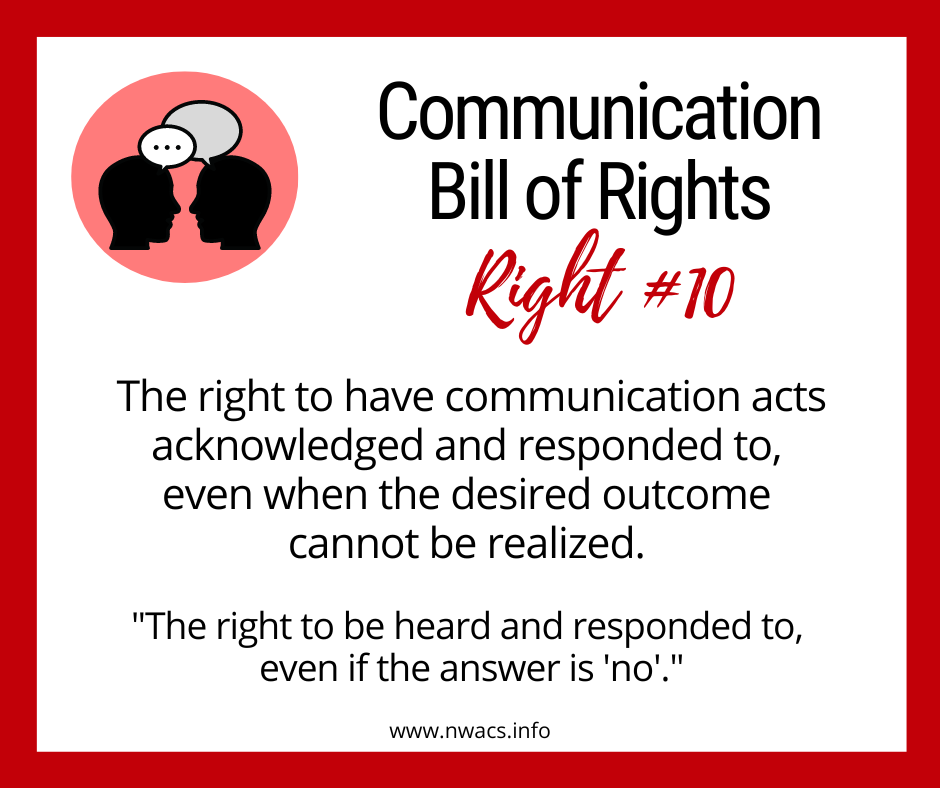Welcome back to Let's Talk AAC - a series of questions and topics for discussion. NWACS will occasionally post a question or topic with related information. Join in the conversation! Add your experiences, resources, related research, etc. in the comments so we can all learn and benefit from each other's knowledge and experience.
reading time: 3 minutes
Right #10 of the Communication Bill of Rights reads: The right to have communication acts acknowledged and responded to even when the desired outcome cannot be realized.
Many of the communication rights we have covered so far are about what a person has a right to communicate:
to request (#2)
to refuse or reject (#3)
to express personal preferences and feelings (#4)
to make choices (#5)
to make comments and share opinions (#6)
to ask for and give information (#7)
Once they have communicated, they have a right to have that communication acknowledged and responded to. Acknowledging and responding may look different depending on the AAC user’s communication ability level.
We need to acknowledge the communication (or communication attempt). That means we let the AAC user know that we are aware of their communication (communication attempt). Have you ever been ignored or had a communication partner that was not paying attention? If so, you know how frustrating or confusing it can be when your communication goes unacknowledged. For an AAC user, it can feel even more frustrating or confusing. It is hard work to communicate using an AAC system. Some communicators may worry whether their communication was even received or noticed. If we want AAC users to keep communicating, we need to make a conscious effort to acknowledge each of their communication attempts.
A special note about emerging communicators. Beginning communicators often use non-symbolic and unconventional ways to communicate. This means that observant communication partners must notice and interpret their communication attempts. We support their communication development by noticing and identifying their communication acts. We can describe what we think are communication acts. Then we attribute meaning to those acts and honor what we think is the intended message.
We also need to respond to their communication (communication attempts). This means that we need to give an answer or reply. We take our conversation turn. We let the AAC user know whether or not we understood their intended message. Sometimes that means we make our best guess at what they are trying to communicate. Sometimes it means we work with them to fill in more information. We give them an answer, add meaning, or otherwise continue the exchange. Responding can look like:
asking for clarification or more information
commenting or adding information
making a connection to past personal experiences
asking a question
saying “no” or “not right now” and explaining why
making a plan to do something when it is not immediately available
adding something to a ‘wish list’
validating by stating known facts
having to repeat ourselves, as we often need to do with children who use spoken language
A special note about emerging communicators. We teach meaning by attributing meaning to communication acts. This great video from AssistiveWare shows what this can look like. Helping beginning communicators learn that they can direct and influence the behavior of others is a step toward symbolic communication. Developing a multimodal communication approach is a great way to support emerging communicators' learning. And it helps bridge them to more symbolic communication.
Acknowledging and responding does not mean always granting. There are times when the appropriate (or needed) response may be “no”. The AAC user deserves the respect of an honest response, even if they cannot have or do something they are requesting. And even if it results in big feelings.
One final note. AAC users may communicate at unexpected times. If we want AAC users to feel included as full participants, we need to acknowledge and respond any time they make a communication attempt. We should acknowledge and attribute meaning to all communication attempts. Even when we are uncertain of the intended meaning. Or when the communication comes at an unexpected time.
What would you add? Join the conversation by commenting below!
Reference:
Attributing Meaning to Communication Acts Annotated Bibliography by Project Core (Center for Literacy and Disability Studies at UNC-Chapel Hill)
Related posts:





